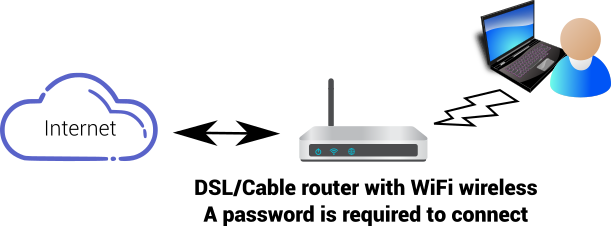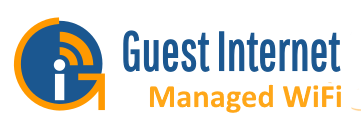Internet Wi-Fi Hotspot Explained
What is Internet Wi-Fi?
In order to explain Internet Wi-Fi, we first need to clarify What is Wi-Fi?
Wi-Fi stands for Wireless Fidelity and it is the technology used by laptops, tablets, mobile phones and other devices to connect to the Internet without wires.
The Internet is delivered via a DSL or cable connection to a wireless router.
A wireless router is an electronic device that sends data from the Internet cable to a device through radio signals instead of another cable.
So, an Internet Wi-Fi is a wireless connection for any device (computers, laptops, tablets, smartphone, etc.).

Most homes and offices have a wireless router that provides Internet. The wireless router has a password (WEP or WPA key), therefore devices can only connect to the Internet when the password is provided.
What is Wi-Fi Hotspot?
Essentially Wi-Fi Hotspot is similar to Internet Wi-Fi, it differs in a few aspects:
- • The wireless router does not have a password, therefore anyone with a mobile device/tablet/laptop can connect to the network;
- • Due to the lack of password, it is typically installed in public locations;
- • Access to the Internet is controlled by a Gateway so that only users who have been given authorization can connect to the Internet.

The wired router gets Internet connection from the Internet Service Provider (ISP), the Gateway is connected to the wired router in order to control who can connect and a wireless access point is connect to the gateway so it can pass the Wi-Fi signal to devices.
What does a Gateway do?
A Gateway is a device that provides authentication, authorization and accounting for a wired or wireless network.
The Gateway has different types of access methods which are selected according to the business' requirements in order to control who has access to the network:
- • User agrees to the terms and conditions of use
- • Business provides a code (paid or free) to the user
- • Social media login (via Facebook)
- • User provides personal information (e.g. name, phone number, email address...) in order to connect to the Internet
It is possible to combine some of these options. For example: provide a free and slow Internet, and then charge for a high speed Internet access.
The Gateway can control the download speed of each user. This is necessary so that the bandwidth (the amount of data that can be carried from one point to another in a given time period - usually a second) available from the DSL or cable provider can be shared equally between all users.
The Gateway has many other features that help the business owner provide guests and visitors with a good reliable Internet service, while ensuring that the business is not put at risk. A few features are:
- • Limit the number of data bytes that a user can download
- • Charging a customer for Internet use via PayPal or Credit/Debit card
- • Monitoring the use of the Hotspot with reports on connected users, usage and billing
- • Generation of codes
- • Setting the Hotspot to be available during certain hours
- • Custom login page, the first thing the guest sees when trying to connect to the Internet
- • The Gateway can send an email to the Hotspot manager with reports, notifications and guest's information
- • The Gateway can have a firewall that prevents any Hotspot users to connect to the business' computers, to prevent hacking
- • The Gateway can block users who are abusing the service and allow approved devices to connect directly to the Internet
- • The Gateway can have a printer connected that prints codes onto tickets
In addition to the features listed above, the Gateway can also have Cloud management.
Cloud management is a tool that permits one or many Gateways to be managed via Cloud service. This is very useful for two types of applications:
- • When a business chain has many locations that provide Internet Wi-Fi for guests, then all Gateways installed on the premises of each location can be managed by one member of staff at a central IT facility
- • When a business uses an IT service provider to take caare of all IT issues
What are the dangers of providing Internet access for guests?
Most retail business have a Point of Sale (PoS) on the premises and many business owners are aware of the danger of hacking that can occour if the PoS is connected directly to the Internet without protection of a firewall. However there are other risks of having the PoS hacked that the business owner may not be aware of. One situation might occur when the business provides Wi-Fi Internet Hotspot access for the customer.
By connecting a Wi-Fi wireless unit directly to the same network as the PoS, any user of the public Wi-Fi is able to access the PoS. An exeperienced credit card thief can steal the credit card information from the PoS in a few minutes, without the need to enter the premises.
Business owners should be aware that a Wi-Fi wireless unit should never be connected directly to the PoS network. The credit card company rules (PCI DSS) requires that a public Wi-Fi wireless unit is connected via one of the two methods:
- 1. The Wi-Fi wireless unit should be connected to a second independent Internet circuit (DSL), or
- 2. The Wi-Fi wireless unit should anly be connected to the PoS network through a second firewall
How to eliminate risks when installing a Wi-Fi Hotspot for guests?
By providing an open Wi-Fi wireless unit the retail business owner is also exposed to risks in addition to those of having credit card information stolen from the PoS.
The public Wi-Fi may be used to share copyrighted material and when that happens the business owner will receive a DMCA Notice from the ISP, advising that illegal file sharing must stop, or else the Internet service will be disconnected. The retailer relies on the Internet service to process credit cards, and so the disconnection of the Internet service will prevent the retailer processing credit card payments.
The public Wi-Fi Internet service can be abused in other ways. Customers can occupy coffee shop tables while using the free service without purchasing products, thereby reducing the profitability of the business. Customers can also download very large files (e.g. videos) which will result in other customers getting a very low Wi-Fi service, and creating a delay to process credit cards, slowing the checkout process.
A Internet Hotspot Gateway will solve the business Wi-Fi problems. The Gateway has a firewall (a network security system designed to prevent unauthorized access to or from a private network) which prevent Wi-Fi users getting access to the PoS and other business computers.
The Gateway also has control mechanisms that prevent illegal file sharing, and also prevents any customer using all the available Internet bandwidth capacity.
The Gateway can also limit the time that a customer can connect to the Internet, preventing a coffee shop or restaurant being occupied by customers who are not purchasing products. The Gateway can also provide a limited time code to each customer at the check out point.
Why choose Guest Internet?
Guest Internet is market leading Internet Hotspot Gateway with content control.
Our low cost Internet Hotspot Gateway has no extra charges or monthly fees and provides the following:
- • Free lifetime support
- • The ability to fully manage public Internet access:
- • Different types of login (agree with disclaimer, email login, login with a code and login via social media)
- • Setting limits to all the users or to individual codes - time limit, speed limit and data limit
- • Manage units remotely with a free Cloud service
- • Display a custom login page with promotional content to customers
- • Charge for access
- • Collect data about customers for marketing
